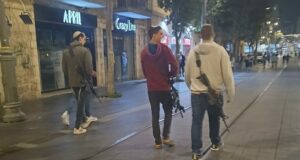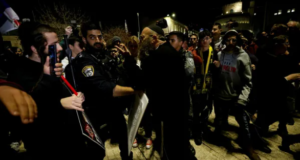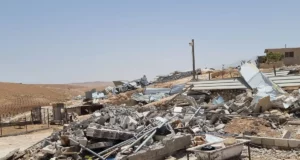26 November 2009
Israeli Occupation Forces closed Huwara checkpoint for over 2 hours last night and established a flying checkpoint nearby as settlers stormed the area. Israeli military and police made little effort to contain settlers as they amassed at the checkpoint, harassing Palestinian vehicles as families waited in vain to be allowed passage to visit relatives on eve of Eid al-Adha, the holy Muslim holiday. The attack occurs amidst an atmosphere of settler outrage at Israeli Prime Minister Netanyahu’s announcement of a partial 10-month freeze of settlement construction in the West Bank, which can be expected to trigger more outbursts of violence in the area.
Huwara checkpoint, located on Road 60 between Huwara village and Nablus, was shut down entirely at approximately 6pm last night, as soldiers positioned a line of jeeps across the road to block oncoming traffic from Nablus. Narrow roads became congested as an influx of cars traveling north to south were forced to re-route through Awarta checkpoint, which had also tightened its restrictions, stopping many cars to search and question their passengers.
As cars backed up Road 60 a third checkpoint was established 500 metres south between Huwara checkpoint and the village itself, allowing a small amount of Palestinian vehicles to proceed only to be turned away later and forced to return the way they came, effectively blocking all Palestinian traffic.
International activists arrived at the scene to witness soldiers aggressively shouting at Palestinian drivers to return to their cars and leave the area, pointing their guns at those who argued with them and ignoring the full-scale traffic jam developing as confused and angry drivers tried to proceed or turn around. When asked why the checkpoint had been closed, soldiers replied that a demonstration was occurring and it was necessary to impede traffic until it had ended.
Managing to pass the first checkpoint activists proceeded further north to Huwara checkpoint where approximately 20 settler youth had gathered on the road, screaming at soldiers as they attempted to contain them. A skirmish occurred as young female settlers grew hysterical, attacking the few Palestinian cars that gained access to the checkpoint (then forced to turn around), and IDF soldiers tried half-heartedly to keep them at bay. Israeli Police arrived shortly thereafter but permitted the settler youths to remain as they continued to run amuck on the roads, kicking and spitting on Palestinian cars as they passed.
By 9pm the military dismantled the flying checkpoint and allowed the flow of traffic to pass Huwara. Several military jeeps and police cars departed as the settlers turned their attention on the activists present, at first verbally, then physically harassing them. Eventually the settler youth left – not under military or police instruction, but of their own volition – obtaining rides from passing cars from the nearby settlement of Bracha.
It was later alleged that the mob of settler youth had been attempting to gain access to Nablus to visit the religious site of Joseph’s Tomb, located south of the city-centre close to Balata Refugee Camp and believed by some Jews to be the final resting place of the biblical patriarch, and thus a holy site not only for Jews but Muslims, Christians and Samaritans alike. The issue has been distorted over the years as settler councils have called for renewed visitation rights, ostensibly on purely religious grounds but can hardly be seen as apolitical, considering the site’s history and location. Similar contention exists regarding Jacob’s Well, another holy site in Nablus where a priest was murdered by zionist extremists in 1979 during a campaign for the site, a Christian church since 384 AD, to be reconstructed as a synagogue. The settler organisation of Gar’in Shchem has recently re-launched its campaign for unregulated Jewish access to the tomb, erecting a protest tent outside the IDF Samaria Division headquarters and announced a demonstration march from outside Nablus for this coming Thursday, 3 December.
Another contributing factor may well be Israeli Prime Minister Netanyahu’s announcement this week of a 10-month partial freeze on settlement construction inside the West Bank. The declaration angered almost all parties across the Israeli political spectrum, most notably Yesha and municipal settlement councils across the West Bank, who have declared they will “continue to build, if necessary” – outside of government restrictions. Backlashes to what is viewed in settler communities as Netanyahu’s political ‘weakness’ frequently occur on the ground in the form of a ‘price tag campaign’ – a co-ordinated outbreak of settler aggression across the West Bank in response to the state’s feeble attempts to restrict settlement expansion and further annexation of Palestinian land.
The settlement ‘freeze’, whilst heralded by some international and Israeli media as a positive contribution to the peace process, can be expected to achieve no such thing on the ground. The freeze does not apply to public buildings – the construction of which a further 28 have just been given approval – or projects already under way. Nor does it apply to East Jerusalem, where over 1500 Palestinian homes have demolition orders, and the construction of a further 900 new apartments were announced this week in the settlement of Gilo. Construction in Palestinian villages in the West Bank has been effectively frozen since the implementation of the Oslo Accords zoning laws, wherein residents of Areas B and C (partial and full Israeli control, respectively) must apply for permits to build or extend homes or public buildings. Buildings in Area C, and even B, are frequently slated for demolition.
 International Solidarity Movement Nonviolence. Justice. Freedom.
International Solidarity Movement Nonviolence. Justice. Freedom.


